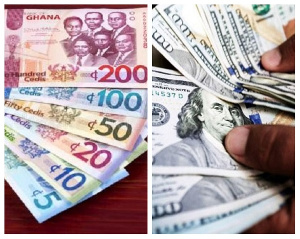
BREAKING: Good News Drops As Cedi Rebounds Against The Dollar -Details Drop
Ghana’s embattled cedi has rebounded 5% against the dollar in March as the government’s decision to suspend external debt payments eased demand for greenbacks in the local foreign exchange market.
The west African nation unilaterally stopped payments on eurobonds and other external debt in December, pending an agreement with creditors that is needed to unlock an International Monetary Fund bailout.
Traders said the impact is beginning to filter through to the currency, after it lost ground in the first two months of the year.
Stopping debt servicing means Ghana will not have to pay $516 million in Eurobond coupons over the first half of this year, according to Samuel Parker-Longdon, a trader at Fidelity Bank Ltd. in Accra.
This “eased the pressure on forex reserves,” Parker-Longdon said. “There is also a bias toward a stronger currency as markets see an IMF deal in reach.”
Positive Sign
Ghana is trying to restructure most of its public debt, estimated at 575.7 billion cedis ($46.8 billion) at the end of November, to IMF board approval for a $3 billion program. It has completed the first part of a domestic debt swap, and in another positive sign, authorities said early this month that initial bilateral talks with China were“progressing well.”
Reaching a deal with China — which accounts for about a third of Ghana’s $5.5 billion bilateral debt — is important because it will help speed up other debt negotiations under the G-20 Common Framework. These must be concluded in order to start talks with eurobond holders.
Economists at RMB Global Market Research told clients in a note that demand for foreign exchange had eased after the debt suspension.
“Market participants are likely to have paused with conversions, as they wait for further updates around the debt restructuring process,” the RMB economists said.
Even after this month’s gains, the cedi is nursing year-to-date losses of about 17.5%. It shed 39% of its value in 2022, and currently trades at around 12.3107 per dollar, from 7.15 a year ago.
Another factor lifting the cedi recently could be the central bank’s decision late last year to stop providing foreign exchange for non-essential imports, said Murega Mungai, a trading-desk manager at AZA Finance. The cedi could strengthen to 12 per dollar by the end of March, a level last seen at the beginning of February, he said.
The central bank’s gross international reserves dropped to $6.2 billion at the end of December from $9.7 billion a year earlier, covering less than three months of imports.
Meanwhile, Ghana’s three-month borrowing costs plunged to the lowest in 10 months on increased demand following the domestic-debt restructuring. The yield on the 91-day treasury bill declined to 20% at the last auction on Friday, the lowest since May. Ghana restructured all bonds of duration two years or longer, leaving the short-term securities as the the only option for fixed-income investors.



Leave a Reply